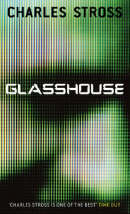Sunday, April 01, 2007

Title:Glasshouse
Author:Charles Stross
Publisher:Orbit
Robin is recovering from some major brain work. Much of his past is a mystery to him, though one thing seems certain, someone is trying to kill him. When he is approached to take part in a historical recreation it seems like the perfect next step. The professors will set up a remote and isolated community, with no interference from the outside and leave to the test group to live according to the rules of the time being studied. The professors are particularly targeting people with various levels of amnesia - obviously because they’ll have less bias or foreknowledge to taint the experiment. Obviously. Nothing to do with people with no memory being malleable and less suspicious about what is really going on. Once inside the Glasshouse, stripped of modern technology, restrained by a lord of the flies style peer pressure, it quickly becomes clear that things are going to get nasty. A sense that isn’t helped by the creeping return of Robin’s memories.
Glasshouse is an indirect sequel to Charles Stross’s Accelerando. Technological innovation has accelerated at such a rate that everything that was is changed. A period of incredible turmoil, clashing/competing formats, redundant data streams. Till a point where finally everything is streamlined, a common format is universally adhered to. Unfortunately when that format is targeted with a virus it spreads quickly, resulting in the Censorship War and the splintering once more into wary individual nations and whole chunks of history having been erased.
With these periods of the past having been lost the bright new future is left with no real idea of what happened in the time that led to the acceleration. It is now regarded as a dark age, a history black spot, and the experiment of the Glasshouse is notionally to work out how life really was in the period between 1950 and 2050. Stross layers questions here - most obviously Glasshouse presents us with a view of our own world shown through the eye’s of an outsider - a classic theme in SF. From that though we also have the idea of history and how things are perceived or distorted with time. Technology distorts perception, when we have a wonderful tool that does something, we don’t quite have the same grasp of how it was done before. So, how will people in 200 years time see the world we live in now? How will the traditions of now blur into the traditions of 10, 20 or 30 years ago? Perhaps as the people in Glasshouse see it - an absurd mash of time, strange rituals and logic - which if presented to us in this form would appear awkward and clumsy. In addition we have the question, what will we leave how will it outlast us - carvings in stone, paper, magnetic tape, disc, virus, erasure.
As a sequel Glasshouse has a difficulty. Accelerando was a dense collection of ideas, short stories written over years and streamed/evolved into a novel. Which gives it a greater depth and maturity in the end. Glasshouse was written as a novel, and feels somehow lighter for that. There are elements of the Accelerando world there, mixed with the Glasshouse, and the censorship wars, that link one to the other. Though the focus is in the environment of the Glasshouse. With that it isn’t really fair to compare a novel that spanned generations and massive changes, to a novel that is set in the aftermath. The flashback to the war feel out of place at times, splashes of a Richard Morgan novel invading the pages. But despite that Glasshouse is an engaging techno thriller, where the core story pulls us in and keeps us turning pages.
Comments:
Post a Comment
 this is the voice of re:mote induction.
this is the voice of re:mote induction.